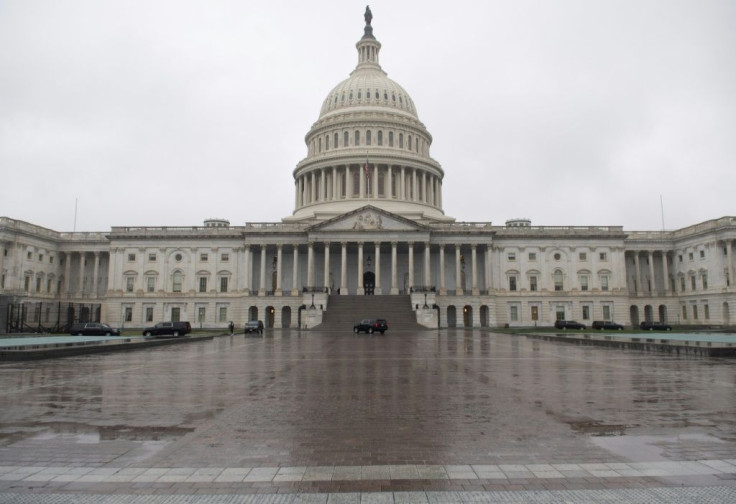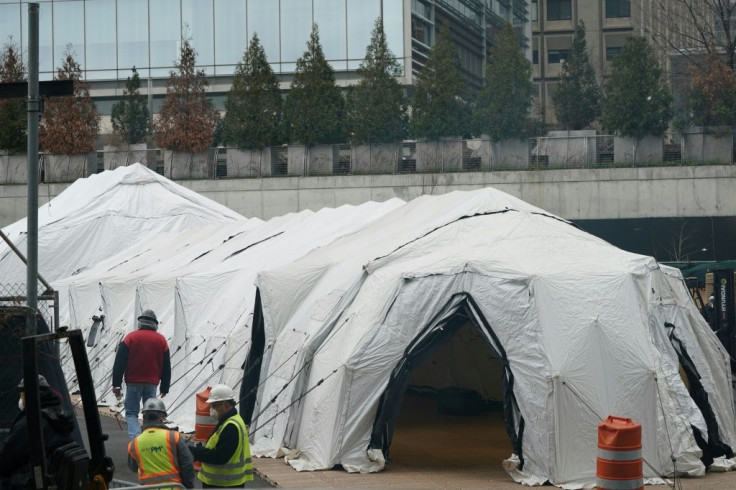Coronavirus Relief Package: House Passes $2.2 Trillion COVID-19 Stimulus, Sends Bill To Trump

KEY POINTS
- Massie's threat forced lawmakers to scramble for flights back to Washington in the case a roll call vote was called
- Both Republicans and Democrats spoke in favor of the $2.2 trillion Senate-passed measure
- President Trump has said he would sign the bill
Update: 3:40 p.m. EDT
President Trump tweeted he had signed the measure, acknowledging it is the biggest economic reliev package in American History.
Update: 3:55 p.m. EDT
President Trump tweeted he would be signing the CARES Act at 4 p.m. EDT.
Original story:
The U.S. House Friday gave final approval to the $2.2 trillion coronavirus relief package that will put cash in the hands of most taxpayers and provide funds to struggling businesses large and small.
The bill was adopted on a voice vote despite objections by Libertarian Thomas Massie of Kentucky, sending the CARES Act to President Trump, who has said he would sign it immediately. Massie first challenged whether there were enough lawmakers present to vote and when that was rejected asked for a roll call, which also was denied.
Trump has been pushing for restrictions that have brought the U.S. economy to a virtual halt to be lifted in areas where the COVID-19 has not yet become a serious problem.
In 2020 dollars, the bill is nearly double the size of the 2009 Recovery Act passed in the wake of the financial crisis and nearly triple the 1933 New Deal approved at the depths of the Great Depression.
The vote came as the number of confirmed coronavirus infections in the U.S. approached 93,000 and the number of deaths topped 1,380. The U.S. now has more cases than any other country.
House Speaker Nancy Pelosi said during the debate, which began at 9 a.m., Americans need help now and praised lawmakers for their swift work on the bill.
"Today as we have all acknowledged, our nation faces an economic and health emergency of historic proportions, the worst pandamic in over 100 years," Pelosi said, adding, "Right now we're going to pass this legislation and that is because so many families have been touched by this crisis."
Pelosi ticked off numerous provisions in the measure, which she said was rewritten to focus on families rather than corporations. She said though the bill doesn't contain everything House Democrats wanted, it is a good start and should be adopted.
"Nurses, doctors and first responders need action," she said, recounting incidents of shortages of personal protective equipment like gowns and masks.
“Coronavirus has knocked at America’s door and faith is answering it,” Rep. Kevin Brady, R-Texas, said in closing arguments for Republicans.
Lawmakers, who had been home on recess, scrambled Thursday to find flights to Washington on less than 24 hours’ notice. Massie tried to block the measure, saying it was an unacceptable addition to the U.S. debt, which currently stands at more than $23.6 trillion.
“If we have a quorum tomorrow, we will take a vote tomorrow,” Pelosi reportedly said during a caucus call Thursday. “The American people want certainty. We need to get this bill passed tomorrow [Friday].”
“We have to get people off their selfishness,” Pelosi added.
Trump called Massie a "third-rate grandstander."
Lawmakers from both sides of the aisle spoke in favor of the bill -- even if it's not perfect.
“We will be tested and we will prevail,” Rep. Adam Schiff, D-Calif., said. “Americans will rise to the challenge. Our healthcare workers already are. … Let us put our people and our country on the road to recovery.”
Rep. Liz Cheney, R-Wyo., said we owe medical workers not only our gratitude but also every tool they need to fight the pandemic.
“This pathogen does not recognize party lines, and a partisan solution will not defeat it,” Cheney said, adding this is “not a time for cynicism, invective or second guessing. … We have overcome every challenge we have faced and we will overcome this one.”
Rep. Nydia Velazquez, D-N.Y., said the bill represents a lifeline to small businesses who are being forced to make “impossible decisions about their future.”
“The American people need relief now. The question now is: Will we step up?” Rep. Joe Neguse, D-Colo., asked.
Rep. John Curtis, R-Utah, called the bill the “key ingredients” to make sure the country can recover from the crisis.
Rep. Roger Marshall, R-Kan., a doctor, urged lawmakers to ignore “petty political” differences and pass the bill.
Reps. Andy Harris, R-Md., and Andy Biggs, R-Ariz., objected to the inclusion of money for things like the Kennedy Center and NPR. “It’s a shame that it’s in here,” Biggs said.
The bill would send $1,200 to taxpayers making less than $75,000 annually ($2,400 for couples), smaller checks for those making $75,000 to $99,00 and nothing for those making more than $99,000. The measure would provide $250 billion for unemployment payments, boosting the maximum benefit by $600 per week, extending coverage by 13 weeks and providing full salary for four months for laid off workers. Part-time, self-employed and free-lance workers also would be covered.
The bill adds $15 billion for food stamps to cover new applicants, $9 billion for child nutrition and $23.5 billion for farmers and ranchers.
The measure also would provide $500 billion for major corporations like airlines, $367 billion for small- and medium-size businesses, $130 billion for hospitals and $150 billion for state and local governments. An oversight board and inspector general would be set up to monitor how the funds to large corporations are distributed. The bill also would prohibit funds from going to any of President Trump’s companies or family members or to lawmakers. Stock buybacks also would be prohibited.
The bill would carve out $17 billion in aid for Boeing and $58 billion for the airlines. Some $25 billion would be allocated for public transit.

© Copyright IBTimes 2024. All rights reserved.





















